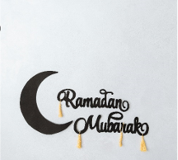 This year, World Day of Muslim Culture, Peace, Dialogue and Film is celebrated on March 11 and, according to the Gregorian calendar, the month of Ramadan begins on March 10. The close proximity of these two important dates offers a great opportunity to introduce the resources that Emory Libraries has about Ramadan and its practices. Ramadan is the ninth month in the Muslim calendar. It is based on the lunar year, which is 11 days shorter than the solar dating system, the basis of the Gregorian calendar. This is the reason why each year, according to the Gregorian calendar, Ramadan falls on a different date. The sighting of the new moon marks the beginning and the end of Ramadan. Thus it lasts 29 or 30 days, depending on when the new crescent moon is visible.
This year, World Day of Muslim Culture, Peace, Dialogue and Film is celebrated on March 11 and, according to the Gregorian calendar, the month of Ramadan begins on March 10. The close proximity of these two important dates offers a great opportunity to introduce the resources that Emory Libraries has about Ramadan and its practices. Ramadan is the ninth month in the Muslim calendar. It is based on the lunar year, which is 11 days shorter than the solar dating system, the basis of the Gregorian calendar. This is the reason why each year, according to the Gregorian calendar, Ramadan falls on a different date. The sighting of the new moon marks the beginning and the end of Ramadan. Thus it lasts 29 or 30 days, depending on when the new crescent moon is visible.
Muslims consider Ramadan one of the holiest and sacred months of the year. They believe that the Holy Qura’n was sent down from heaven in this month on Laylat al-Qadr. The whole month is dedicated to prayer and the reading of the Qur’an. Throughout the month, Muslims fast from before dawn to sunset. Sawm (fasting) is one of the Five Pillars of Islam or religious duty every Muslim is obliged to perform (the other four being shahada (the profession of faith), salat (prayer), zakat (alms), hajj (pilgrimage). Fasting means not just abstention from food and drink, but also self-improvement and physical and spiritual self-restraint. One should avoid negative acts such as gossiping, backbiting, or lying, to bring Muslims closer to Allah. Eid al-Fitr ends the Ramadan fasting. After a special prayer in the morning, people visit family and friends. Many Muslims believe that this time of the year is the best time to donate and pay their Zakat (the fixed percentage of income that should be given to the poor).
The following resources provide information on the customs, traditions, and spirituality of the Ramadan.
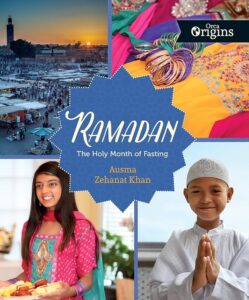 Ramadan: The Holy Month of Fasting explores the richness and diversity of the Islamic tradition by focusing on an event of great spiritual significance and beauty in the lives of Muslims. Rich with personal stories and stunning photographs, Ramadan demystifies the traditions and emphasizes the importance of diversity.
Ramadan: The Holy Month of Fasting explores the richness and diversity of the Islamic tradition by focusing on an event of great spiritual significance and beauty in the lives of Muslims. Rich with personal stories and stunning photographs, Ramadan demystifies the traditions and emphasizes the importance of diversity.
The Light of Islam = Nūr al-Islām This book gives a brief introduction of Islam: The Holy Quran, prayer, worship, zakat, fasting, pilgrimage, marriage, divorce, food, and penal laws.
Fasting and feasting in Morocco : women’s participation in Ramadan Fasting during Ramadan is or many the most important role for women in Islamic practice, revealing the strategies women deploy to earn religious merit. Rather than downplaying the role of women in religious practice, this work shows that female pious acts are essential to the carrying out of religious doctrine and equal in importance than the special prayers said by men in the mosques.
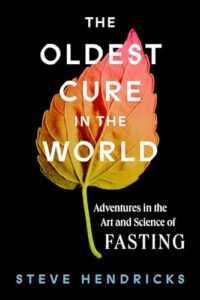 The Oldest Cure in the World: Adventures in the Art and Science of Fasting When should we eat, and when shouldn’t we? Steve Hendricks shows in The Oldest Cure in the World, stop eating long enough (fasting) and you’ll set in motion cellular repairs that can slow aging and prevent and reverse diseases like diabetes and hypertension. Fasting has improved the lives of people with epilepsy, asthma, and arthritis, and has even protected patients from the worst of chemotherapy’s side effects.
The Oldest Cure in the World: Adventures in the Art and Science of Fasting When should we eat, and when shouldn’t we? Steve Hendricks shows in The Oldest Cure in the World, stop eating long enough (fasting) and you’ll set in motion cellular repairs that can slow aging and prevent and reverse diseases like diabetes and hypertension. Fasting has improved the lives of people with epilepsy, asthma, and arthritis, and has even protected patients from the worst of chemotherapy’s side effects.
Fasting Changed My Life By reading this book you’ll learn what medical science says about fasting; what others think about fasting; and how to lose weight by fasting. This book helps us understand spiritual teachings about fasting; exercise an exhilarating control of your life; experience a new peace and confidence; find an unbelievable strength to overcome trials; and discover your purpose for living.
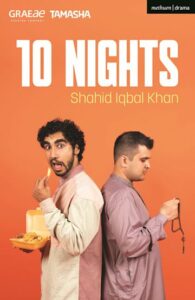 10 Nights by Shahid Iqbal Khan, is the story of one man’s journey of self-discovery and facing the consequences of your actions. When Yasser decides to take part in itikaf, sleeping and fasting in the mosque for the last ten nights of Ramadan, he soon regrets his decision. But as he navigates smug worshippers, shared bathrooms, and recurring thoughts of chunky chips, Yasser’s isolation forces him to confront a side of himself he’s been trying to keep hidden. Itifaf is central to the spirituality of Ramadan. It involves staying at home or in the mosque, away from worldly affairs, for a certain number of days and devoting time to worship. Muslims sit in Itikaf for the last 10 days of the Ramadan including Laylat al-Qadr.
10 Nights by Shahid Iqbal Khan, is the story of one man’s journey of self-discovery and facing the consequences of your actions. When Yasser decides to take part in itikaf, sleeping and fasting in the mosque for the last ten nights of Ramadan, he soon regrets his decision. But as he navigates smug worshippers, shared bathrooms, and recurring thoughts of chunky chips, Yasser’s isolation forces him to confront a side of himself he’s been trying to keep hidden. Itifaf is central to the spirituality of Ramadan. It involves staying at home or in the mosque, away from worldly affairs, for a certain number of days and devoting time to worship. Muslims sit in Itikaf for the last 10 days of the Ramadan including Laylat al-Qadr.
Islamic philanthropy : Exploring zakat, waqf, and sadaqah in Islamic finance and economics In Islam, philanthropy includes activities that differ in purpose and the principles that govern the giving. This book identifies three types of philanthropy: philanthropy as relief (zakat), which seeks to alleviate human suffering; philanthropy as an improvement (waqf), which seeks to maximize individual human potential and is energized by a principle that seeks to progress individuals and their society; and philanthropy as reform (Sadaqat)o, which seeks to solve social problems.
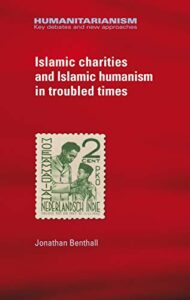 Islamic charities and Islamic humanism in troubled times This work is the fruit of twenty years’ reflection on Islamic charities, both practically and as a key to understand the crisis in contemporary Islam. On the one hand Islam is undervalued as a moral and political force whose admirable qualities are epitomized in its strong tradition of charitable giving. On the other hand, it suffers from a crisis of authority that cannot be blamed entirely on the history of colonialism and stigmatization.
Islamic charities and Islamic humanism in troubled times This work is the fruit of twenty years’ reflection on Islamic charities, both practically and as a key to understand the crisis in contemporary Islam. On the one hand Islam is undervalued as a moral and political force whose admirable qualities are epitomized in its strong tradition of charitable giving. On the other hand, it suffers from a crisis of authority that cannot be blamed entirely on the history of colonialism and stigmatization.
Divine money : Islam, Zakat, and giving in Palestine Where government and public safety nets fail, zakat serves as a form of social security in Muslim communities. In, Emanuel Schaeublin shows how zakat institutions and direct zakat donations function in contemporary Palestine. Based on his ethnographic fieldwork in the city of Nablus, Schaeublin traces zakat flows as they provide critical support to households living under military rule and security surveillance.
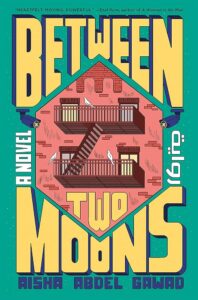 Between two moons: a novel A deeply moving family story about identity, faith, and belonging set in the Muslim immigrant enclave of Bay Ridge, Brooklyn following three siblings coming of age over the course of one Ramadan. It’s the holy month of Ramadan, and twin sisters Amira and Lina are about to graduate high school in Bay Ridge, Brooklyn. On the precipice of adulthood, they plan to embark on a summer of teenage revelry, trying on new identities and testing the limits of what they can get away with while still under their parents’ roof.
Between two moons: a novel A deeply moving family story about identity, faith, and belonging set in the Muslim immigrant enclave of Bay Ridge, Brooklyn following three siblings coming of age over the course of one Ramadan. It’s the holy month of Ramadan, and twin sisters Amira and Lina are about to graduate high school in Bay Ridge, Brooklyn. On the precipice of adulthood, they plan to embark on a summer of teenage revelry, trying on new identities and testing the limits of what they can get away with while still under their parents’ roof.
The Ramadan sonnets (Ramadan-Poetry), not always a spiritual meditation, nor often even what should be felt and achieved during the fast. The poems are striving for some reality of feeling and experience. These poems are an imaginatively inspired record of the month, its small epiphanies and grim endurances, heading out from its physical constraints to contemplate a vast panorama, or focusing in on particulars, those embryos of explosive meaning, to evoke the blessed month of Ramadan’s intertwining flavors of asceticism and sensual gratitude, its palatable and palpable Light.
The Eid hug Anwar, a mid 50s British Pakistani, is only invited into his father’s open arms twice a year on Eid. His parents had a love marriage, and his Sikh mother eloped with his father as a teenager. But Anwar and his siblings were expected to conform.
Video & streaming (visual materials):
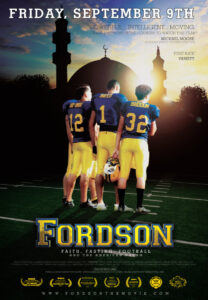 Fordson: faith, fasting, football Follows a predominately Arab-American high school football team from a working-class Detroit suburb as they practice for their big cross-town rivalry game during the last ten days of Ramadan, revealing a community holding onto its Islamic faith while they struggle for acceptance in post 9/11 America.
Fordson: faith, fasting, football Follows a predominately Arab-American high school football team from a working-class Detroit suburb as they practice for their big cross-town rivalry game during the last ten days of Ramadan, revealing a community holding onto its Islamic faith while they struggle for acceptance in post 9/11 America.
Gayelle. Series 1, Programme 3, 1986 On the first part of the documentary, Errol Sitahal joins the Moon Sighting Committee interviewing Haji Imam Hassan Karimullah, the Imam of the St. James Jamaat, who explains the process of sighting the new moon to mark the opening of the month of Ramadan.
—Neda Zeraatkar, Middle East and Islamic Studies librarian
